Emergent Philosophy of Education: A Griffith University 7401EDN Essay
VerifiedAdded on 2023/01/17
|14
|4193
|80
Essay
AI Summary
This essay provides a comprehensive exploration of emergent philosophy of education, focusing on the core principles and practices within the context of early childhood education. It begins by defining emergent curriculum and its emphasis on child-led learning, active participation, and flexible teaching methods. The essay then articulates a philosophical stance informed by the ideas of key thinkers such as Piaget, Dewey, and Vygotsky, examining their contributions to understanding child development and learning processes. Vygotsky's Social Development Theory, Piaget's cognitive development theory, and Dewey's concept of experiential education are discussed in detail. The essay also identifies and applies key literature generated by these thinkers. The essay further aligns the emergent philosophy with the Australian Professional Standards for Teachers and the Griffith Dimensions of Learning and Teaching. The essay integrates a metaphor to enhance clarity. In conclusion, the essay synthesizes the views about the emergent philosophy of education, its theoretical underpinnings, and its practical implications for effective teaching and learning. This essay is a contribution to Desklib, a platform offering AI-driven study tools.

Running head: Emergent Philosophy of Education
Emergent Philosophy of Education
Emergent Philosophy of Education
Paraphrase This Document
Need a fresh take? Get an instant paraphrase of this document with our AI Paraphraser
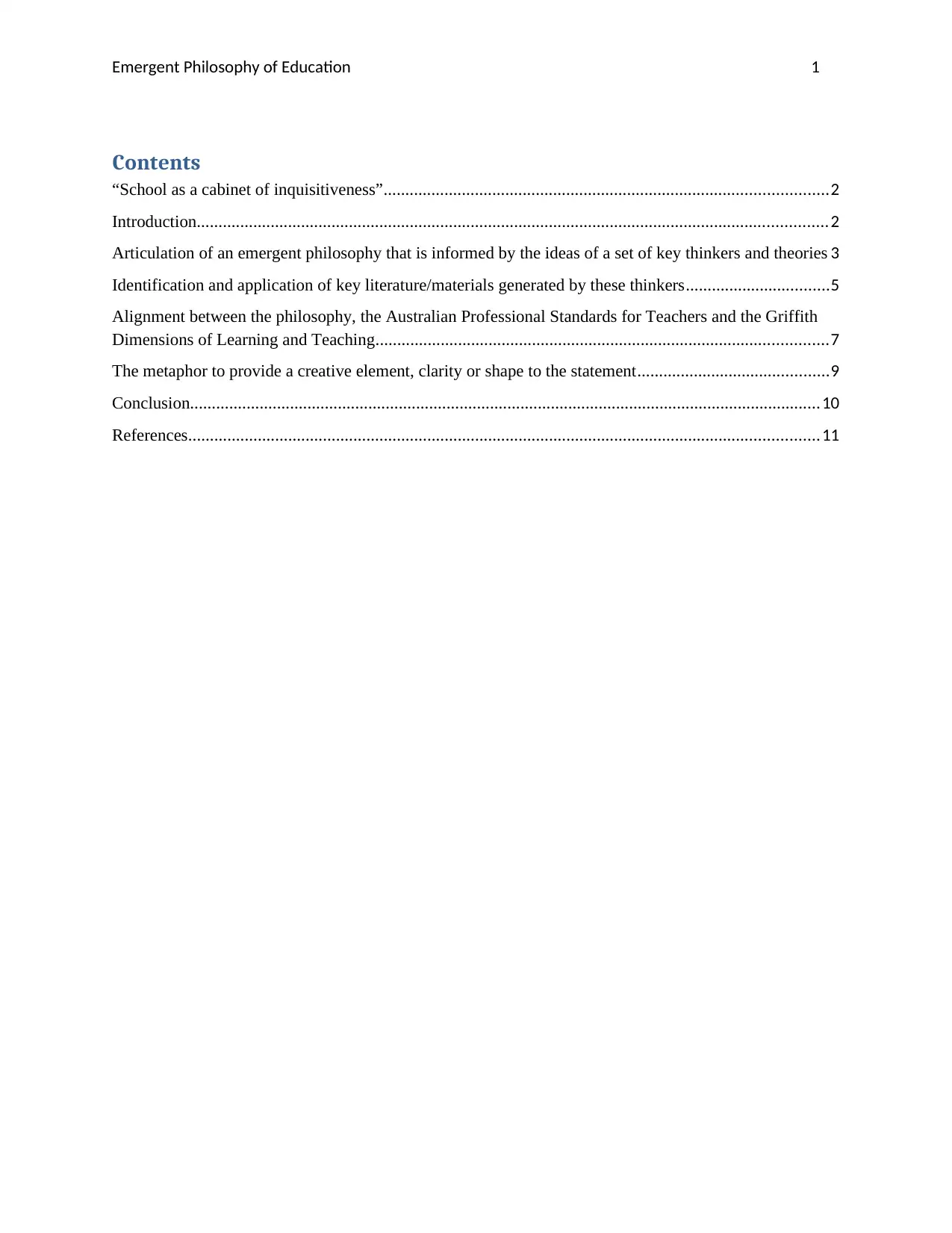
Emergent Philosophy of Education 1
Contents
“School as a cabinet of inquisitiveness”......................................................................................................2
Introduction.................................................................................................................................................2
Articulation of an emergent philosophy that is informed by the ideas of a set of key thinkers and theories 3
Identification and application of key literature/materials generated by these thinkers.................................5
Alignment between the philosophy, the Australian Professional Standards for Teachers and the Griffith
Dimensions of Learning and Teaching........................................................................................................7
The metaphor to provide a creative element, clarity or shape to the statement............................................9
Conclusion.................................................................................................................................................10
References.................................................................................................................................................11
Contents
“School as a cabinet of inquisitiveness”......................................................................................................2
Introduction.................................................................................................................................................2
Articulation of an emergent philosophy that is informed by the ideas of a set of key thinkers and theories 3
Identification and application of key literature/materials generated by these thinkers.................................5
Alignment between the philosophy, the Australian Professional Standards for Teachers and the Griffith
Dimensions of Learning and Teaching........................................................................................................7
The metaphor to provide a creative element, clarity or shape to the statement............................................9
Conclusion.................................................................................................................................................10
References.................................................................................................................................................11

Emergent Philosophy of Education 2
“School as a cabinet of inquisitiveness”
Introduction
Emergent curriculum pertains to the philosophy of teaching and focuses on the methods of
planning the curriculum which responses to the interests of children. It helps them to create
meaningful learning experiences. It highlights active participation, adopting flexible methods,
relationship building and play-based learning activities amongst the students.This philosophy is
initiated by the interests of children. It is collaborative and responses to the necessities of the
children. It is believed that the learning of children is the key to success in this teaching program
(Gaines, 2016). The teachers need to be patient, flexible and are required to observe, document
and creatively brainstorm in order to plan the emergent curriculum as per the Griffith Learning &
Teaching Capabilities Framework.
The philosophy of emergent curriculum is initiated by taking an insight into the interests of
children.The teaching content is influenced by values which are held for the child's learning
through community, school, culture and family. So, in this model, the classroom comprises of
learning centers which help in facilitating and expanding the learning of children. In this context,
the Australian Professional Standards for Teachers explain the expertise and knowledge which is
expected from efficient and proficient teachers. The Professional Standards assure that the
efficiency of teachers creates an impact on children. They emphasize on the fact that the quality
of teaching is the dominant factor which influences the achievement of students(Australian
Professional Standards For Teachers, 2018).
So, this philosophical statement intends to synthesize the views about the emergent philosophy
of education.These views shall be linked with the ideas of thinkers and theories of this field.
Furthermore, key literature and material generated by these thinkers shall also be identified and
discussed in this statement.The ideologies presented in this philosophical statement shall also be
aligned with the Australian Professional Standards and the Griffith Dimensions of Learning and
Teaching. Lastly, a metaphor would also be included to provide creativity and clarity to the
statement.
“School as a cabinet of inquisitiveness”
Introduction
Emergent curriculum pertains to the philosophy of teaching and focuses on the methods of
planning the curriculum which responses to the interests of children. It helps them to create
meaningful learning experiences. It highlights active participation, adopting flexible methods,
relationship building and play-based learning activities amongst the students.This philosophy is
initiated by the interests of children. It is collaborative and responses to the necessities of the
children. It is believed that the learning of children is the key to success in this teaching program
(Gaines, 2016). The teachers need to be patient, flexible and are required to observe, document
and creatively brainstorm in order to plan the emergent curriculum as per the Griffith Learning &
Teaching Capabilities Framework.
The philosophy of emergent curriculum is initiated by taking an insight into the interests of
children.The teaching content is influenced by values which are held for the child's learning
through community, school, culture and family. So, in this model, the classroom comprises of
learning centers which help in facilitating and expanding the learning of children. In this context,
the Australian Professional Standards for Teachers explain the expertise and knowledge which is
expected from efficient and proficient teachers. The Professional Standards assure that the
efficiency of teachers creates an impact on children. They emphasize on the fact that the quality
of teaching is the dominant factor which influences the achievement of students(Australian
Professional Standards For Teachers, 2018).
So, this philosophical statement intends to synthesize the views about the emergent philosophy
of education.These views shall be linked with the ideas of thinkers and theories of this field.
Furthermore, key literature and material generated by these thinkers shall also be identified and
discussed in this statement.The ideologies presented in this philosophical statement shall also be
aligned with the Australian Professional Standards and the Griffith Dimensions of Learning and
Teaching. Lastly, a metaphor would also be included to provide creativity and clarity to the
statement.
⊘ This is a preview!⊘
Do you want full access?
Subscribe today to unlock all pages.

Trusted by 1+ million students worldwide
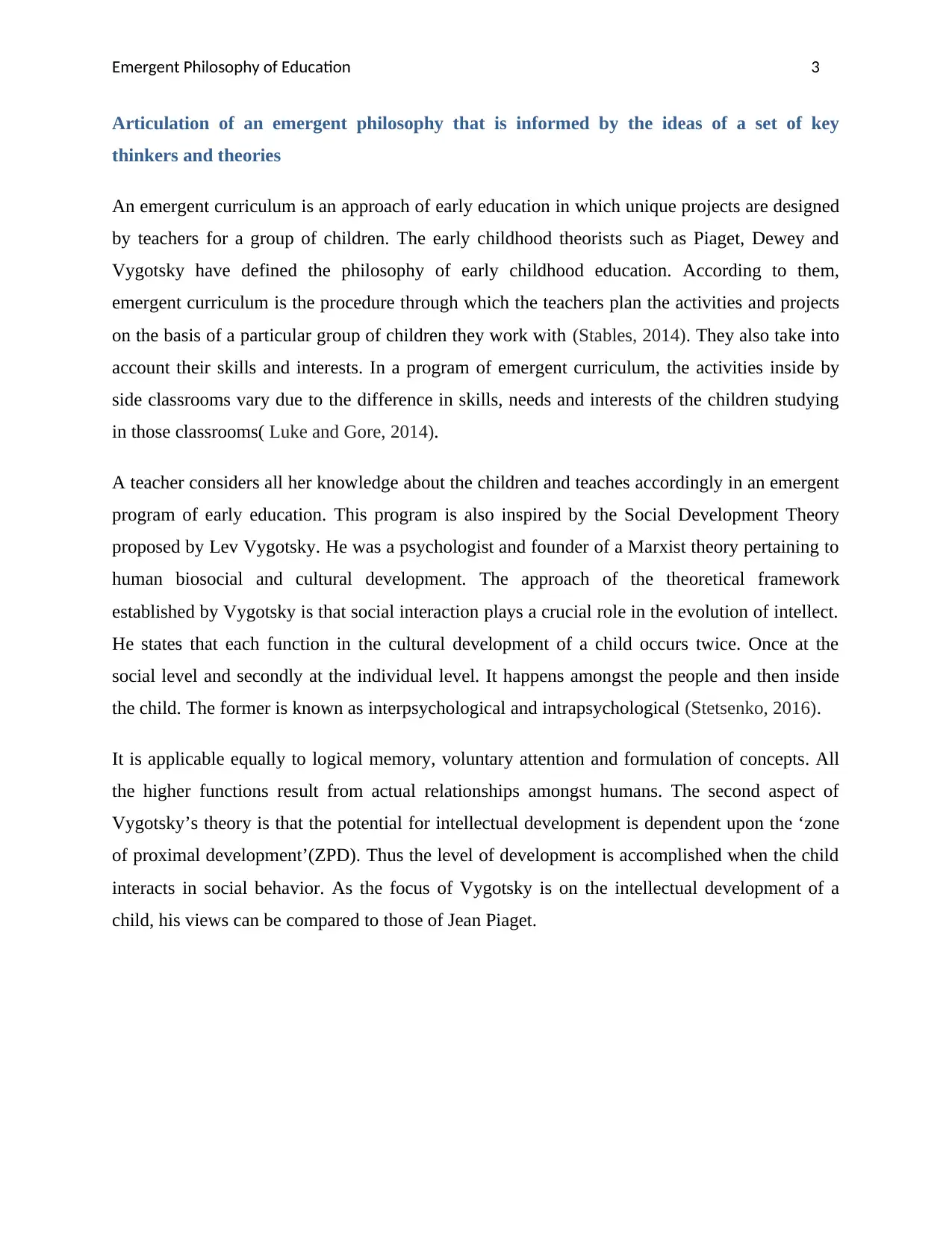
Emergent Philosophy of Education 3
Articulation of an emergent philosophy that is informed by the ideas of a set of key
thinkers and theories
An emergent curriculum is an approach of early education in which unique projects are designed
by teachers for a group of children. The early childhood theorists such as Piaget, Dewey and
Vygotsky have defined the philosophy of early childhood education. According to them,
emergent curriculum is the procedure through which the teachers plan the activities and projects
on the basis of a particular group of children they work with (Stables, 2014). They also take into
account their skills and interests. In a program of emergent curriculum, the activities inside by
side classrooms vary due to the difference in skills, needs and interests of the children studying
in those classrooms( Luke and Gore, 2014).
A teacher considers all her knowledge about the children and teaches accordingly in an emergent
program of early education. This program is also inspired by the Social Development Theory
proposed by Lev Vygotsky. He was a psychologist and founder of a Marxist theory pertaining to
human biosocial and cultural development. The approach of the theoretical framework
established by Vygotsky is that social interaction plays a crucial role in the evolution of intellect.
He states that each function in the cultural development of a child occurs twice. Once at the
social level and secondly at the individual level. It happens amongst the people and then inside
the child. The former is known as interpsychological and intrapsychological (Stetsenko, 2016).
It is applicable equally to logical memory, voluntary attention and formulation of concepts. All
the higher functions result from actual relationships amongst humans. The second aspect of
Vygotsky’s theory is that the potential for intellectual development is dependent upon the ‘zone
of proximal development’(ZPD). Thus the level of development is accomplished when the child
interacts in social behavior. As the focus of Vygotsky is on the intellectual development of a
child, his views can be compared to those of Jean Piaget.
Articulation of an emergent philosophy that is informed by the ideas of a set of key
thinkers and theories
An emergent curriculum is an approach of early education in which unique projects are designed
by teachers for a group of children. The early childhood theorists such as Piaget, Dewey and
Vygotsky have defined the philosophy of early childhood education. According to them,
emergent curriculum is the procedure through which the teachers plan the activities and projects
on the basis of a particular group of children they work with (Stables, 2014). They also take into
account their skills and interests. In a program of emergent curriculum, the activities inside by
side classrooms vary due to the difference in skills, needs and interests of the children studying
in those classrooms( Luke and Gore, 2014).
A teacher considers all her knowledge about the children and teaches accordingly in an emergent
program of early education. This program is also inspired by the Social Development Theory
proposed by Lev Vygotsky. He was a psychologist and founder of a Marxist theory pertaining to
human biosocial and cultural development. The approach of the theoretical framework
established by Vygotsky is that social interaction plays a crucial role in the evolution of intellect.
He states that each function in the cultural development of a child occurs twice. Once at the
social level and secondly at the individual level. It happens amongst the people and then inside
the child. The former is known as interpsychological and intrapsychological (Stetsenko, 2016).
It is applicable equally to logical memory, voluntary attention and formulation of concepts. All
the higher functions result from actual relationships amongst humans. The second aspect of
Vygotsky’s theory is that the potential for intellectual development is dependent upon the ‘zone
of proximal development’(ZPD). Thus the level of development is accomplished when the child
interacts in social behavior. As the focus of Vygotsky is on the intellectual development of a
child, his views can be compared to those of Jean Piaget.
Paraphrase This Document
Need a fresh take? Get an instant paraphrase of this document with our AI Paraphraser

Emergent Philosophy of Education 4
Zone of Proximal Development
Jean Piaget was a Swiss psychologist who is known for his work on the intellectual development
of a child. His theory of cognitive development along with epistemological views are known as
genetic epistemology. His theory of cognitive development describes the way in which a child
develops a mental model of the world. He denied the idea that intellect is a fixed attribute rather
he regarded it as a procedure occurring as a result of interaction and biological maturity. As per
Piaget, a child is borne with a basic mental nature which is inherited genetically by him and
develops gradually on the basis of subsequent knowledge and learning (Tanner, 2016).
John Dewey also stated his theory of pragmatism which have greatly influenced the reforms in
education. He is known as one of the fathers of functional philosophy. He also voiced in favor of
progressive education and liberalism. His theory of education was published in his work
‘Experience and Education’ in the year 1938. It assessed the traditional and progressive methods
of education. The focus of traditional education was on heritage and curriculum and it defined
the learning path of students. Progressive education, on the other hand, was more targeted
towards the aptitude of students as compared to that of subject or teacher.
In his opinion, the thoughts of neither of the schools were appropriate.He believed that
progressive education was a too unstructured and traditional mode of education was more strict.
He further explained that progressive education was more specific and traditional education had
no regards for the interest of the learners. So, he rejected both the theories and proposed the
Zone of Proximal Development
Jean Piaget was a Swiss psychologist who is known for his work on the intellectual development
of a child. His theory of cognitive development along with epistemological views are known as
genetic epistemology. His theory of cognitive development describes the way in which a child
develops a mental model of the world. He denied the idea that intellect is a fixed attribute rather
he regarded it as a procedure occurring as a result of interaction and biological maturity. As per
Piaget, a child is borne with a basic mental nature which is inherited genetically by him and
develops gradually on the basis of subsequent knowledge and learning (Tanner, 2016).
John Dewey also stated his theory of pragmatism which have greatly influenced the reforms in
education. He is known as one of the fathers of functional philosophy. He also voiced in favor of
progressive education and liberalism. His theory of education was published in his work
‘Experience and Education’ in the year 1938. It assessed the traditional and progressive methods
of education. The focus of traditional education was on heritage and curriculum and it defined
the learning path of students. Progressive education, on the other hand, was more targeted
towards the aptitude of students as compared to that of subject or teacher.
In his opinion, the thoughts of neither of the schools were appropriate.He believed that
progressive education was a too unstructured and traditional mode of education was more strict.
He further explained that progressive education was more specific and traditional education had
no regards for the interest of the learners. So, he rejected both the theories and proposed the
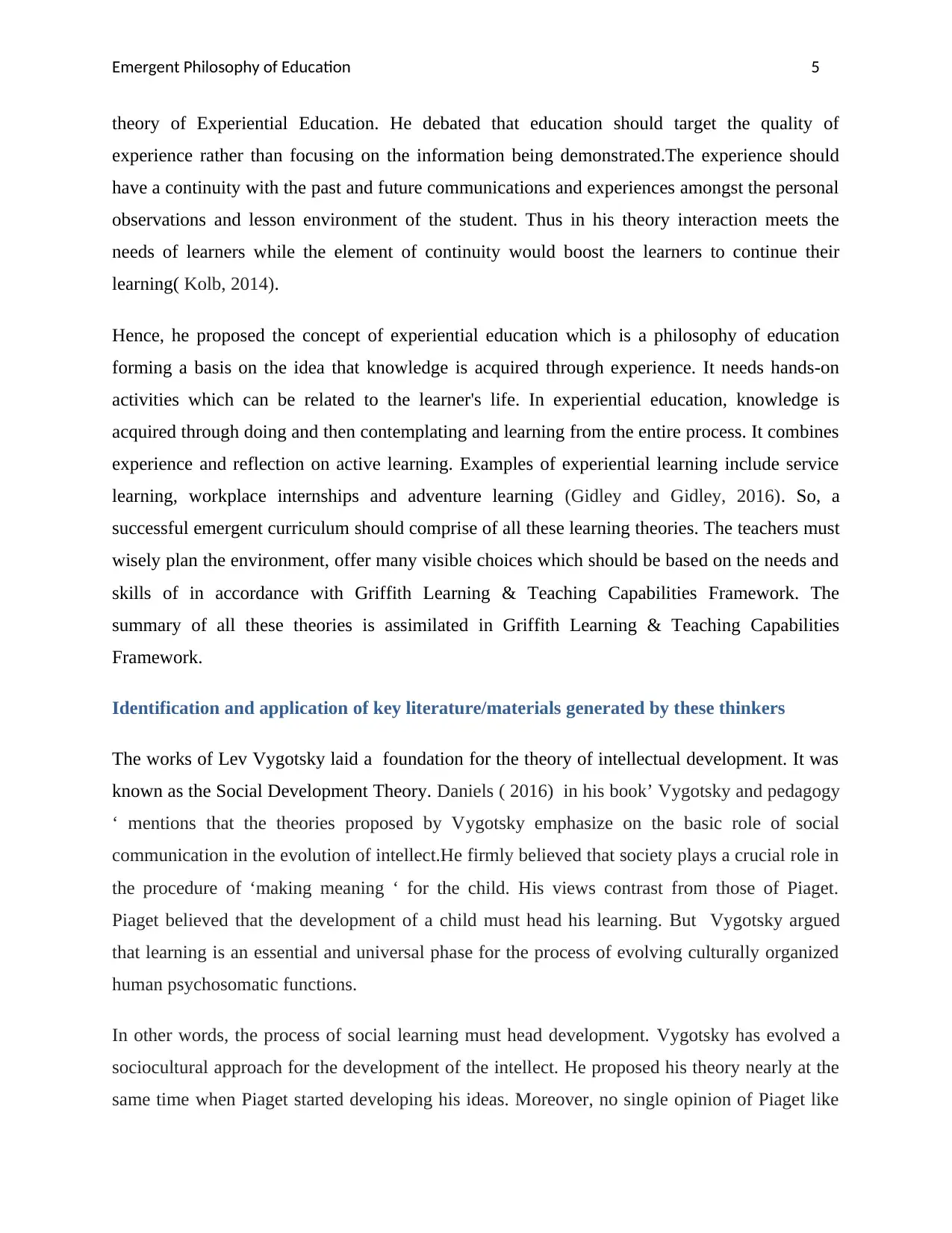
Emergent Philosophy of Education 5
theory of Experiential Education. He debated that education should target the quality of
experience rather than focusing on the information being demonstrated.The experience should
have a continuity with the past and future communications and experiences amongst the personal
observations and lesson environment of the student. Thus in his theory interaction meets the
needs of learners while the element of continuity would boost the learners to continue their
learning( Kolb, 2014).
Hence, he proposed the concept of experiential education which is a philosophy of education
forming a basis on the idea that knowledge is acquired through experience. It needs hands-on
activities which can be related to the learner's life. In experiential education, knowledge is
acquired through doing and then contemplating and learning from the entire process. It combines
experience and reflection on active learning. Examples of experiential learning include service
learning, workplace internships and adventure learning (Gidley and Gidley, 2016). So, a
successful emergent curriculum should comprise of all these learning theories. The teachers must
wisely plan the environment, offer many visible choices which should be based on the needs and
skills of in accordance with Griffith Learning & Teaching Capabilities Framework. The
summary of all these theories is assimilated in Griffith Learning & Teaching Capabilities
Framework.
Identification and application of key literature/materials generated by these thinkers
The works of Lev Vygotsky laid a foundation for the theory of intellectual development. It was
known as the Social Development Theory. Daniels ( 2016) in his book’ Vygotsky and pedagogy
‘ mentions that the theories proposed by Vygotsky emphasize on the basic role of social
communication in the evolution of intellect.He firmly believed that society plays a crucial role in
the procedure of ‘making meaning ‘ for the child. His views contrast from those of Piaget.
Piaget believed that the development of a child must head his learning. But Vygotsky argued
that learning is an essential and universal phase for the process of evolving culturally organized
human psychosomatic functions.
In other words, the process of social learning must head development. Vygotsky has evolved a
sociocultural approach for the development of the intellect. He proposed his theory nearly at the
same time when Piaget started developing his ideas. Moreover, no single opinion of Piaget like
theory of Experiential Education. He debated that education should target the quality of
experience rather than focusing on the information being demonstrated.The experience should
have a continuity with the past and future communications and experiences amongst the personal
observations and lesson environment of the student. Thus in his theory interaction meets the
needs of learners while the element of continuity would boost the learners to continue their
learning( Kolb, 2014).
Hence, he proposed the concept of experiential education which is a philosophy of education
forming a basis on the idea that knowledge is acquired through experience. It needs hands-on
activities which can be related to the learner's life. In experiential education, knowledge is
acquired through doing and then contemplating and learning from the entire process. It combines
experience and reflection on active learning. Examples of experiential learning include service
learning, workplace internships and adventure learning (Gidley and Gidley, 2016). So, a
successful emergent curriculum should comprise of all these learning theories. The teachers must
wisely plan the environment, offer many visible choices which should be based on the needs and
skills of in accordance with Griffith Learning & Teaching Capabilities Framework. The
summary of all these theories is assimilated in Griffith Learning & Teaching Capabilities
Framework.
Identification and application of key literature/materials generated by these thinkers
The works of Lev Vygotsky laid a foundation for the theory of intellectual development. It was
known as the Social Development Theory. Daniels ( 2016) in his book’ Vygotsky and pedagogy
‘ mentions that the theories proposed by Vygotsky emphasize on the basic role of social
communication in the evolution of intellect.He firmly believed that society plays a crucial role in
the procedure of ‘making meaning ‘ for the child. His views contrast from those of Piaget.
Piaget believed that the development of a child must head his learning. But Vygotsky argued
that learning is an essential and universal phase for the process of evolving culturally organized
human psychosomatic functions.
In other words, the process of social learning must head development. Vygotsky has evolved a
sociocultural approach for the development of the intellect. He proposed his theory nearly at the
same time when Piaget started developing his ideas. Moreover, no single opinion of Piaget like
⊘ This is a preview!⊘
Do you want full access?
Subscribe today to unlock all pages.

Trusted by 1+ million students worldwide
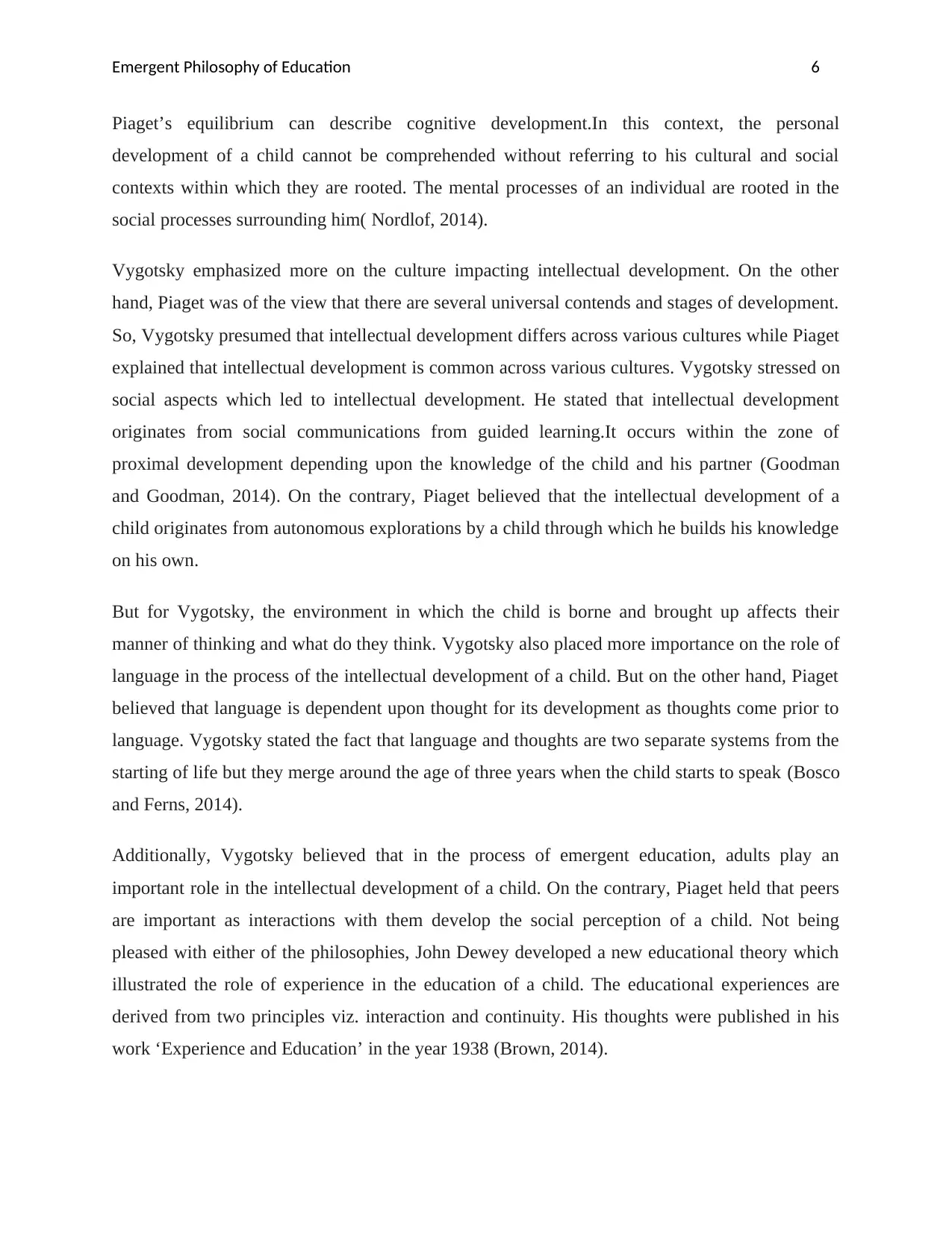
Emergent Philosophy of Education 6
Piaget’s equilibrium can describe cognitive development.In this context, the personal
development of a child cannot be comprehended without referring to his cultural and social
contexts within which they are rooted. The mental processes of an individual are rooted in the
social processes surrounding him( Nordlof, 2014).
Vygotsky emphasized more on the culture impacting intellectual development. On the other
hand, Piaget was of the view that there are several universal contends and stages of development.
So, Vygotsky presumed that intellectual development differs across various cultures while Piaget
explained that intellectual development is common across various cultures. Vygotsky stressed on
social aspects which led to intellectual development. He stated that intellectual development
originates from social communications from guided learning.It occurs within the zone of
proximal development depending upon the knowledge of the child and his partner (Goodman
and Goodman, 2014). On the contrary, Piaget believed that the intellectual development of a
child originates from autonomous explorations by a child through which he builds his knowledge
on his own.
But for Vygotsky, the environment in which the child is borne and brought up affects their
manner of thinking and what do they think. Vygotsky also placed more importance on the role of
language in the process of the intellectual development of a child. But on the other hand, Piaget
believed that language is dependent upon thought for its development as thoughts come prior to
language. Vygotsky stated the fact that language and thoughts are two separate systems from the
starting of life but they merge around the age of three years when the child starts to speak (Bosco
and Ferns, 2014).
Additionally, Vygotsky believed that in the process of emergent education, adults play an
important role in the intellectual development of a child. On the contrary, Piaget held that peers
are important as interactions with them develop the social perception of a child. Not being
pleased with either of the philosophies, John Dewey developed a new educational theory which
illustrated the role of experience in the education of a child. The educational experiences are
derived from two principles viz. interaction and continuity. His thoughts were published in his
work ‘Experience and Education’ in the year 1938 (Brown, 2014).
Piaget’s equilibrium can describe cognitive development.In this context, the personal
development of a child cannot be comprehended without referring to his cultural and social
contexts within which they are rooted. The mental processes of an individual are rooted in the
social processes surrounding him( Nordlof, 2014).
Vygotsky emphasized more on the culture impacting intellectual development. On the other
hand, Piaget was of the view that there are several universal contends and stages of development.
So, Vygotsky presumed that intellectual development differs across various cultures while Piaget
explained that intellectual development is common across various cultures. Vygotsky stressed on
social aspects which led to intellectual development. He stated that intellectual development
originates from social communications from guided learning.It occurs within the zone of
proximal development depending upon the knowledge of the child and his partner (Goodman
and Goodman, 2014). On the contrary, Piaget believed that the intellectual development of a
child originates from autonomous explorations by a child through which he builds his knowledge
on his own.
But for Vygotsky, the environment in which the child is borne and brought up affects their
manner of thinking and what do they think. Vygotsky also placed more importance on the role of
language in the process of the intellectual development of a child. But on the other hand, Piaget
believed that language is dependent upon thought for its development as thoughts come prior to
language. Vygotsky stated the fact that language and thoughts are two separate systems from the
starting of life but they merge around the age of three years when the child starts to speak (Bosco
and Ferns, 2014).
Additionally, Vygotsky believed that in the process of emergent education, adults play an
important role in the intellectual development of a child. On the contrary, Piaget held that peers
are important as interactions with them develop the social perception of a child. Not being
pleased with either of the philosophies, John Dewey developed a new educational theory which
illustrated the role of experience in the education of a child. The educational experiences are
derived from two principles viz. interaction and continuity. His thoughts were published in his
work ‘Experience and Education’ in the year 1938 (Brown, 2014).
Paraphrase This Document
Need a fresh take? Get an instant paraphrase of this document with our AI Paraphraser
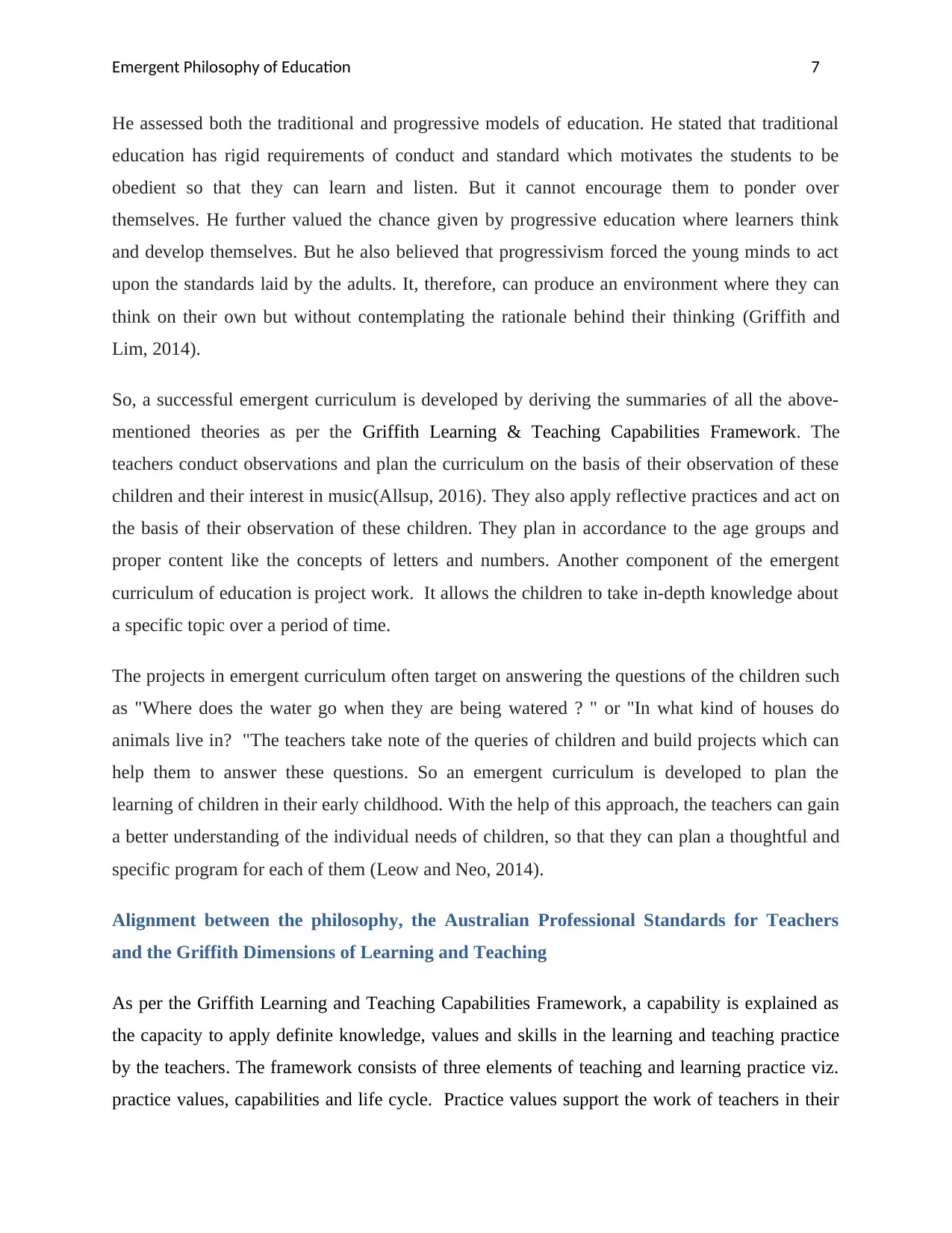
Emergent Philosophy of Education 7
He assessed both the traditional and progressive models of education. He stated that traditional
education has rigid requirements of conduct and standard which motivates the students to be
obedient so that they can learn and listen. But it cannot encourage them to ponder over
themselves. He further valued the chance given by progressive education where learners think
and develop themselves. But he also believed that progressivism forced the young minds to act
upon the standards laid by the adults. It, therefore, can produce an environment where they can
think on their own but without contemplating the rationale behind their thinking (Griffith and
Lim, 2014).
So, a successful emergent curriculum is developed by deriving the summaries of all the above-
mentioned theories as per the Griffith Learning & Teaching Capabilities Framework. The
teachers conduct observations and plan the curriculum on the basis of their observation of these
children and their interest in music(Allsup, 2016). They also apply reflective practices and act on
the basis of their observation of these children. They plan in accordance to the age groups and
proper content like the concepts of letters and numbers. Another component of the emergent
curriculum of education is project work. It allows the children to take in-depth knowledge about
a specific topic over a period of time.
The projects in emergent curriculum often target on answering the questions of the children such
as "Where does the water go when they are being watered ? " or "In what kind of houses do
animals live in? "The teachers take note of the queries of children and build projects which can
help them to answer these questions. So an emergent curriculum is developed to plan the
learning of children in their early childhood. With the help of this approach, the teachers can gain
a better understanding of the individual needs of children, so that they can plan a thoughtful and
specific program for each of them (Leow and Neo, 2014).
Alignment between the philosophy, the Australian Professional Standards for Teachers
and the Griffith Dimensions of Learning and Teaching
As per the Griffith Learning and Teaching Capabilities Framework, a capability is explained as
the capacity to apply definite knowledge, values and skills in the learning and teaching practice
by the teachers. The framework consists of three elements of teaching and learning practice viz.
practice values, capabilities and life cycle. Practice values support the work of teachers in their
He assessed both the traditional and progressive models of education. He stated that traditional
education has rigid requirements of conduct and standard which motivates the students to be
obedient so that they can learn and listen. But it cannot encourage them to ponder over
themselves. He further valued the chance given by progressive education where learners think
and develop themselves. But he also believed that progressivism forced the young minds to act
upon the standards laid by the adults. It, therefore, can produce an environment where they can
think on their own but without contemplating the rationale behind their thinking (Griffith and
Lim, 2014).
So, a successful emergent curriculum is developed by deriving the summaries of all the above-
mentioned theories as per the Griffith Learning & Teaching Capabilities Framework. The
teachers conduct observations and plan the curriculum on the basis of their observation of these
children and their interest in music(Allsup, 2016). They also apply reflective practices and act on
the basis of their observation of these children. They plan in accordance to the age groups and
proper content like the concepts of letters and numbers. Another component of the emergent
curriculum of education is project work. It allows the children to take in-depth knowledge about
a specific topic over a period of time.
The projects in emergent curriculum often target on answering the questions of the children such
as "Where does the water go when they are being watered ? " or "In what kind of houses do
animals live in? "The teachers take note of the queries of children and build projects which can
help them to answer these questions. So an emergent curriculum is developed to plan the
learning of children in their early childhood. With the help of this approach, the teachers can gain
a better understanding of the individual needs of children, so that they can plan a thoughtful and
specific program for each of them (Leow and Neo, 2014).
Alignment between the philosophy, the Australian Professional Standards for Teachers
and the Griffith Dimensions of Learning and Teaching
As per the Griffith Learning and Teaching Capabilities Framework, a capability is explained as
the capacity to apply definite knowledge, values and skills in the learning and teaching practice
by the teachers. The framework consists of three elements of teaching and learning practice viz.
practice values, capabilities and life cycle. Practice values support the work of teachers in their
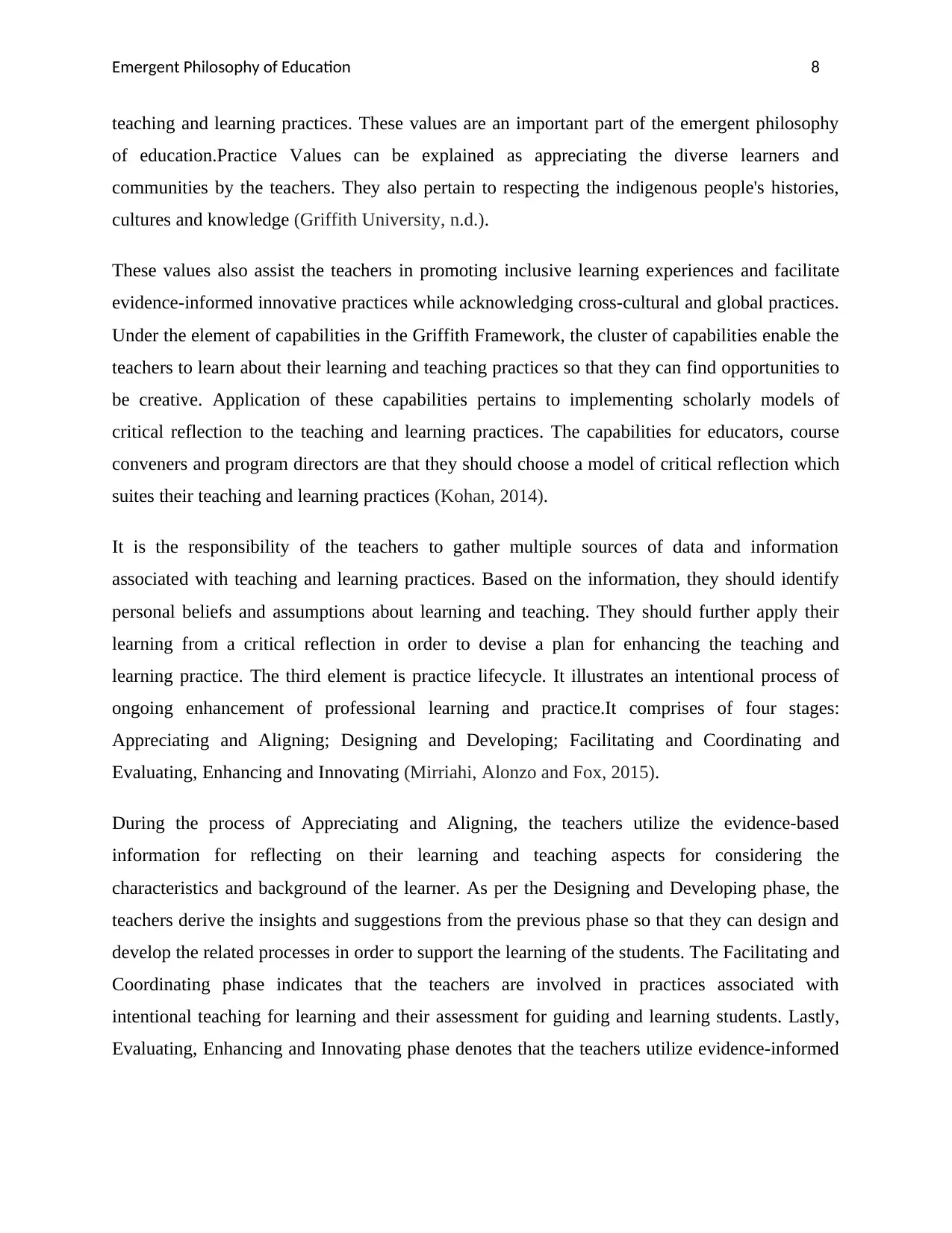
Emergent Philosophy of Education 8
teaching and learning practices. These values are an important part of the emergent philosophy
of education.Practice Values can be explained as appreciating the diverse learners and
communities by the teachers. They also pertain to respecting the indigenous people's histories,
cultures and knowledge (Griffith University, n.d.).
These values also assist the teachers in promoting inclusive learning experiences and facilitate
evidence-informed innovative practices while acknowledging cross-cultural and global practices.
Under the element of capabilities in the Griffith Framework, the cluster of capabilities enable the
teachers to learn about their learning and teaching practices so that they can find opportunities to
be creative. Application of these capabilities pertains to implementing scholarly models of
critical reflection to the teaching and learning practices. The capabilities for educators, course
conveners and program directors are that they should choose a model of critical reflection which
suites their teaching and learning practices (Kohan, 2014).
It is the responsibility of the teachers to gather multiple sources of data and information
associated with teaching and learning practices. Based on the information, they should identify
personal beliefs and assumptions about learning and teaching. They should further apply their
learning from a critical reflection in order to devise a plan for enhancing the teaching and
learning practice. The third element is practice lifecycle. It illustrates an intentional process of
ongoing enhancement of professional learning and practice.It comprises of four stages:
Appreciating and Aligning; Designing and Developing; Facilitating and Coordinating and
Evaluating, Enhancing and Innovating (Mirriahi, Alonzo and Fox, 2015).
During the process of Appreciating and Aligning, the teachers utilize the evidence-based
information for reflecting on their learning and teaching aspects for considering the
characteristics and background of the learner. As per the Designing and Developing phase, the
teachers derive the insights and suggestions from the previous phase so that they can design and
develop the related processes in order to support the learning of the students. The Facilitating and
Coordinating phase indicates that the teachers are involved in practices associated with
intentional teaching for learning and their assessment for guiding and learning students. Lastly,
Evaluating, Enhancing and Innovating phase denotes that the teachers utilize evidence-informed
teaching and learning practices. These values are an important part of the emergent philosophy
of education.Practice Values can be explained as appreciating the diverse learners and
communities by the teachers. They also pertain to respecting the indigenous people's histories,
cultures and knowledge (Griffith University, n.d.).
These values also assist the teachers in promoting inclusive learning experiences and facilitate
evidence-informed innovative practices while acknowledging cross-cultural and global practices.
Under the element of capabilities in the Griffith Framework, the cluster of capabilities enable the
teachers to learn about their learning and teaching practices so that they can find opportunities to
be creative. Application of these capabilities pertains to implementing scholarly models of
critical reflection to the teaching and learning practices. The capabilities for educators, course
conveners and program directors are that they should choose a model of critical reflection which
suites their teaching and learning practices (Kohan, 2014).
It is the responsibility of the teachers to gather multiple sources of data and information
associated with teaching and learning practices. Based on the information, they should identify
personal beliefs and assumptions about learning and teaching. They should further apply their
learning from a critical reflection in order to devise a plan for enhancing the teaching and
learning practice. The third element is practice lifecycle. It illustrates an intentional process of
ongoing enhancement of professional learning and practice.It comprises of four stages:
Appreciating and Aligning; Designing and Developing; Facilitating and Coordinating and
Evaluating, Enhancing and Innovating (Mirriahi, Alonzo and Fox, 2015).
During the process of Appreciating and Aligning, the teachers utilize the evidence-based
information for reflecting on their learning and teaching aspects for considering the
characteristics and background of the learner. As per the Designing and Developing phase, the
teachers derive the insights and suggestions from the previous phase so that they can design and
develop the related processes in order to support the learning of the students. The Facilitating and
Coordinating phase indicates that the teachers are involved in practices associated with
intentional teaching for learning and their assessment for guiding and learning students. Lastly,
Evaluating, Enhancing and Innovating phase denotes that the teachers utilize evidence-informed
⊘ This is a preview!⊘
Do you want full access?
Subscribe today to unlock all pages.

Trusted by 1+ million students worldwide

Emergent Philosophy of Education 9
approaches for developing their practices and suggesting the practice enhancements (Kitson,
2015).
The Australian Professional Standards for Teachers also work on creating values and capabilities
for teachers so that they can evolve and modify their teaching practice continuously. They
describe the work of teachers and explain the components of efficient teaching which shall
improve the outcomes for the students. Standards provide a framework for defining knowledge.
Professional involvement and practice are required for teachers. They comprise of seven
standards which describe what teachers should know and are capable of doing. These are
grouped into three domains viz. Professional Knowledge, Professional Practice and Professional
Engagement (Henderson and Trede, 2017).
The domain of Professional Knowledge suggests that the teachers should be familiar with the
different linguistic, religious and cultural backgrounds of their students. Professional Practice
denotes that teachers should be able to make learning engaged and valued. They should create a
safe, challenging and inclusive learning environment and must implement equitable and fair
behavior management plans. Professional Engagement is associated with effective learning of
teachers. In this process, they analyze their own learning needs and expand their learning on an
individual and collegial level. They exhibit the values of professionalism and respect through all
their interactions with their colleagues, students, parents and community.
So, in this way, the idea of emergent philosophy of education is linked with Australian
Professional Standards for Teachers and Griffith Learning and Teaching Capabilities
Framework. The components of frameworks and standards along with the ideology of emergent
education are targeted towards one goal i.e. a thoughtful plan of the environment and curriculum
which caters to the need of children (Osberg,2015).
The metaphor to provide a creative element, clarity or shape to the statement
For a longer period of time, it was assumed that the goal of formal education is arrival at a
certain point in the world. But in the modern world, the meaning of education has been changed
through the emergent philosophy of education. The metaphor "School as a cabinet of
inquisitiveness “ truly defines it. Through this philosophy, the teachers craft new learning spaces
approaches for developing their practices and suggesting the practice enhancements (Kitson,
2015).
The Australian Professional Standards for Teachers also work on creating values and capabilities
for teachers so that they can evolve and modify their teaching practice continuously. They
describe the work of teachers and explain the components of efficient teaching which shall
improve the outcomes for the students. Standards provide a framework for defining knowledge.
Professional involvement and practice are required for teachers. They comprise of seven
standards which describe what teachers should know and are capable of doing. These are
grouped into three domains viz. Professional Knowledge, Professional Practice and Professional
Engagement (Henderson and Trede, 2017).
The domain of Professional Knowledge suggests that the teachers should be familiar with the
different linguistic, religious and cultural backgrounds of their students. Professional Practice
denotes that teachers should be able to make learning engaged and valued. They should create a
safe, challenging and inclusive learning environment and must implement equitable and fair
behavior management plans. Professional Engagement is associated with effective learning of
teachers. In this process, they analyze their own learning needs and expand their learning on an
individual and collegial level. They exhibit the values of professionalism and respect through all
their interactions with their colleagues, students, parents and community.
So, in this way, the idea of emergent philosophy of education is linked with Australian
Professional Standards for Teachers and Griffith Learning and Teaching Capabilities
Framework. The components of frameworks and standards along with the ideology of emergent
education are targeted towards one goal i.e. a thoughtful plan of the environment and curriculum
which caters to the need of children (Osberg,2015).
The metaphor to provide a creative element, clarity or shape to the statement
For a longer period of time, it was assumed that the goal of formal education is arrival at a
certain point in the world. But in the modern world, the meaning of education has been changed
through the emergent philosophy of education. The metaphor "School as a cabinet of
inquisitiveness “ truly defines it. Through this philosophy, the teachers craft new learning spaces
Paraphrase This Document
Need a fresh take? Get an instant paraphrase of this document with our AI Paraphraser
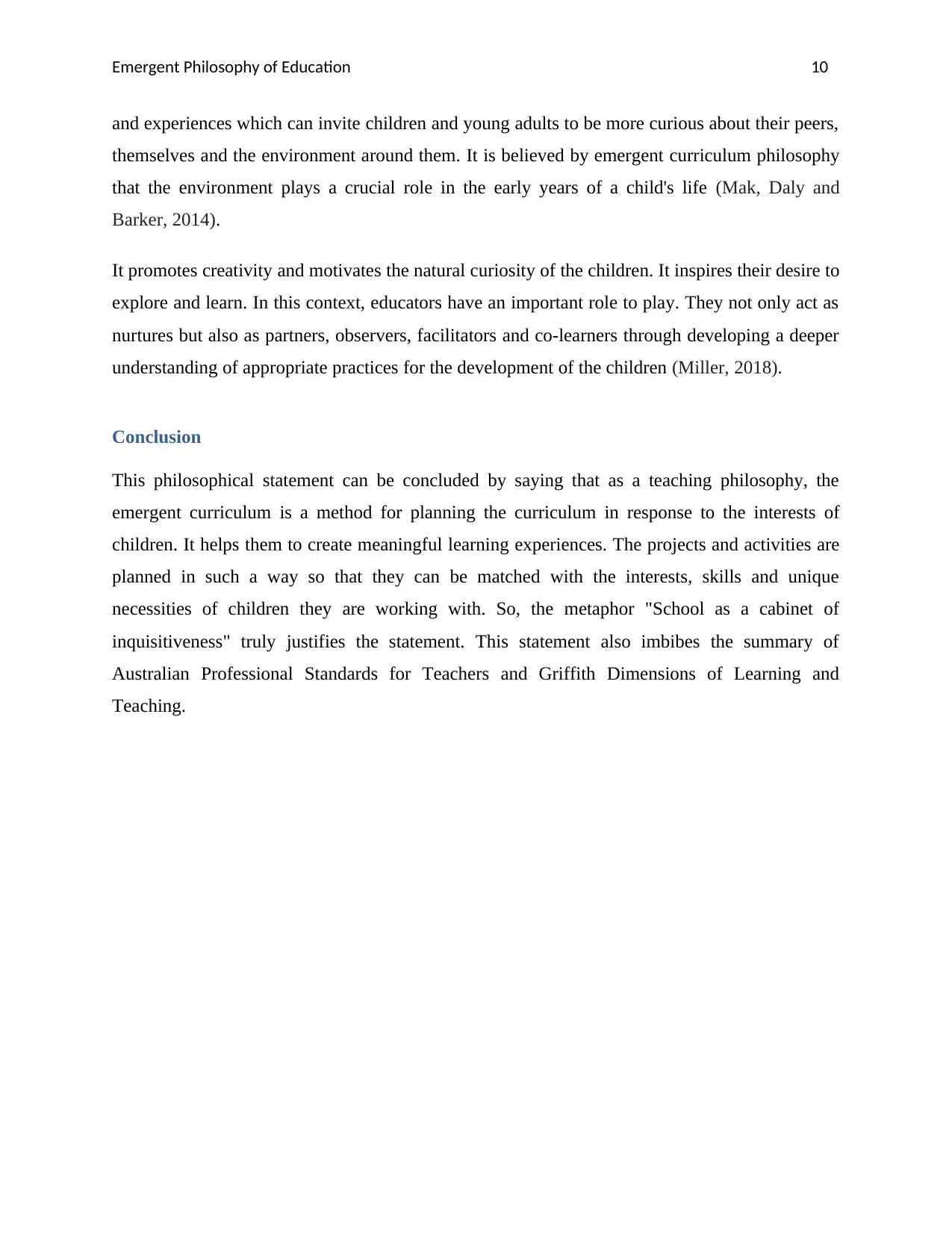
Emergent Philosophy of Education 10
and experiences which can invite children and young adults to be more curious about their peers,
themselves and the environment around them. It is believed by emergent curriculum philosophy
that the environment plays a crucial role in the early years of a child's life (Mak, Daly and
Barker, 2014).
It promotes creativity and motivates the natural curiosity of the children. It inspires their desire to
explore and learn. In this context, educators have an important role to play. They not only act as
nurtures but also as partners, observers, facilitators and co-learners through developing a deeper
understanding of appropriate practices for the development of the children (Miller, 2018).
Conclusion
This philosophical statement can be concluded by saying that as a teaching philosophy, the
emergent curriculum is a method for planning the curriculum in response to the interests of
children. It helps them to create meaningful learning experiences. The projects and activities are
planned in such a way so that they can be matched with the interests, skills and unique
necessities of children they are working with. So, the metaphor "School as a cabinet of
inquisitiveness" truly justifies the statement. This statement also imbibes the summary of
Australian Professional Standards for Teachers and Griffith Dimensions of Learning and
Teaching.
and experiences which can invite children and young adults to be more curious about their peers,
themselves and the environment around them. It is believed by emergent curriculum philosophy
that the environment plays a crucial role in the early years of a child's life (Mak, Daly and
Barker, 2014).
It promotes creativity and motivates the natural curiosity of the children. It inspires their desire to
explore and learn. In this context, educators have an important role to play. They not only act as
nurtures but also as partners, observers, facilitators and co-learners through developing a deeper
understanding of appropriate practices for the development of the children (Miller, 2018).
Conclusion
This philosophical statement can be concluded by saying that as a teaching philosophy, the
emergent curriculum is a method for planning the curriculum in response to the interests of
children. It helps them to create meaningful learning experiences. The projects and activities are
planned in such a way so that they can be matched with the interests, skills and unique
necessities of children they are working with. So, the metaphor "School as a cabinet of
inquisitiveness" truly justifies the statement. This statement also imbibes the summary of
Australian Professional Standards for Teachers and Griffith Dimensions of Learning and
Teaching.
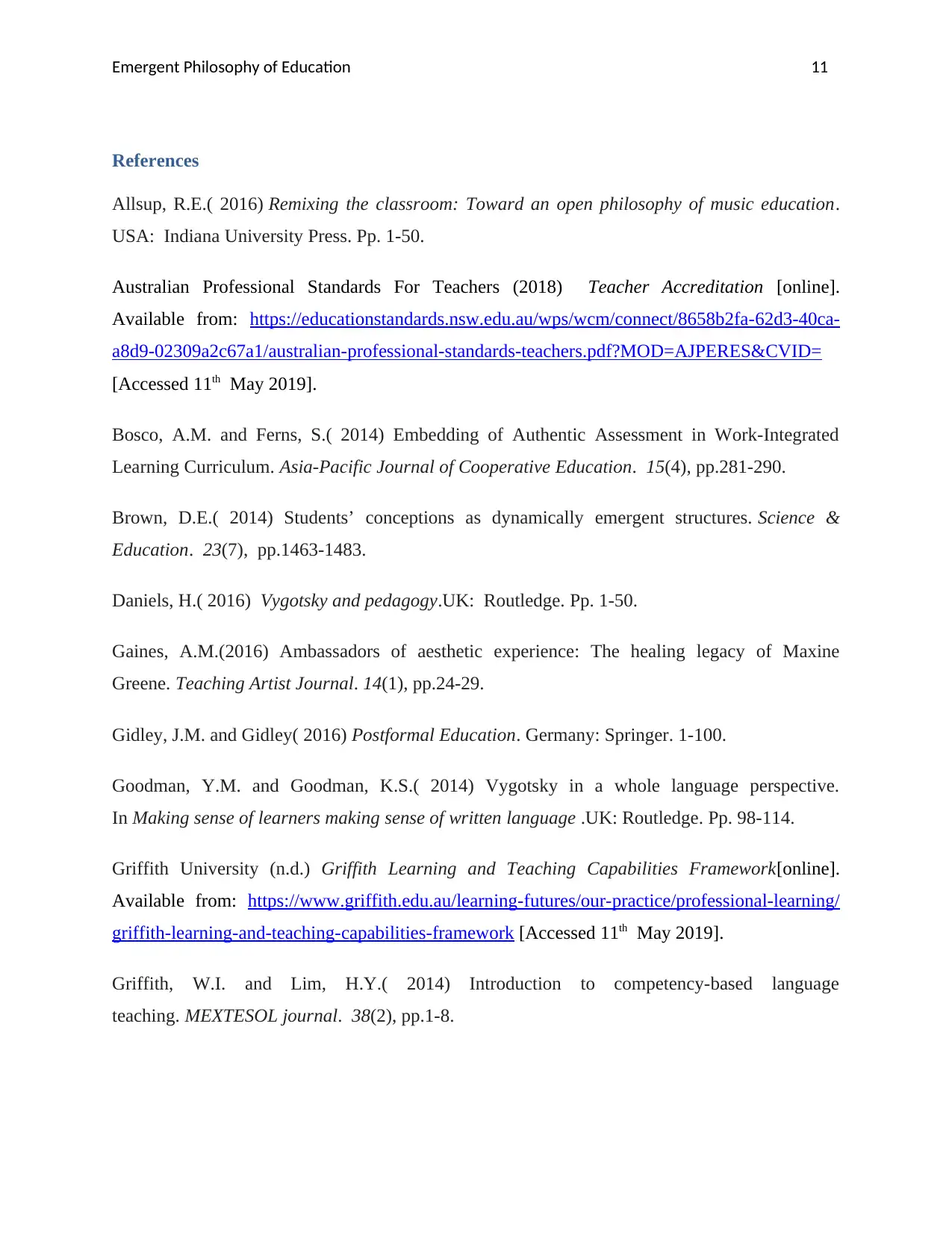
Emergent Philosophy of Education 11
References
Allsup, R.E.( 2016) Remixing the classroom: Toward an open philosophy of music education.
USA: Indiana University Press. Pp. 1-50.
Australian Professional Standards For Teachers (2018) Teacher Accreditation [online].
Available from: https://educationstandards.nsw.edu.au/wps/wcm/connect/8658b2fa-62d3-40ca-
a8d9-02309a2c67a1/australian-professional-standards-teachers.pdf?MOD=AJPERES&CVID=
[Accessed 11th May 2019].
Bosco, A.M. and Ferns, S.( 2014) Embedding of Authentic Assessment in Work-Integrated
Learning Curriculum. Asia-Pacific Journal of Cooperative Education. 15(4), pp.281-290.
Brown, D.E.( 2014) Students’ conceptions as dynamically emergent structures. Science &
Education. 23(7), pp.1463-1483.
Daniels, H.( 2016) Vygotsky and pedagogy.UK: Routledge. Pp. 1-50.
Gaines, A.M.(2016) Ambassadors of aesthetic experience: The healing legacy of Maxine
Greene. Teaching Artist Journal. 14(1), pp.24-29.
Gidley, J.M. and Gidley( 2016) Postformal Education. Germany: Springer. 1-100.
Goodman, Y.M. and Goodman, K.S.( 2014) Vygotsky in a whole language perspective.
In Making sense of learners making sense of written language .UK: Routledge. Pp. 98-114.
Griffith University (n.d.) Griffith Learning and Teaching Capabilities Framework[online].
Available from: https://www.griffith.edu.au/learning-futures/our-practice/professional-learning/
griffith-learning-and-teaching-capabilities-framework [Accessed 11th May 2019].
Griffith, W.I. and Lim, H.Y.( 2014) Introduction to competency-based language
teaching. MEXTESOL journal. 38(2), pp.1-8.
References
Allsup, R.E.( 2016) Remixing the classroom: Toward an open philosophy of music education.
USA: Indiana University Press. Pp. 1-50.
Australian Professional Standards For Teachers (2018) Teacher Accreditation [online].
Available from: https://educationstandards.nsw.edu.au/wps/wcm/connect/8658b2fa-62d3-40ca-
a8d9-02309a2c67a1/australian-professional-standards-teachers.pdf?MOD=AJPERES&CVID=
[Accessed 11th May 2019].
Bosco, A.M. and Ferns, S.( 2014) Embedding of Authentic Assessment in Work-Integrated
Learning Curriculum. Asia-Pacific Journal of Cooperative Education. 15(4), pp.281-290.
Brown, D.E.( 2014) Students’ conceptions as dynamically emergent structures. Science &
Education. 23(7), pp.1463-1483.
Daniels, H.( 2016) Vygotsky and pedagogy.UK: Routledge. Pp. 1-50.
Gaines, A.M.(2016) Ambassadors of aesthetic experience: The healing legacy of Maxine
Greene. Teaching Artist Journal. 14(1), pp.24-29.
Gidley, J.M. and Gidley( 2016) Postformal Education. Germany: Springer. 1-100.
Goodman, Y.M. and Goodman, K.S.( 2014) Vygotsky in a whole language perspective.
In Making sense of learners making sense of written language .UK: Routledge. Pp. 98-114.
Griffith University (n.d.) Griffith Learning and Teaching Capabilities Framework[online].
Available from: https://www.griffith.edu.au/learning-futures/our-practice/professional-learning/
griffith-learning-and-teaching-capabilities-framework [Accessed 11th May 2019].
Griffith, W.I. and Lim, H.Y.( 2014) Introduction to competency-based language
teaching. MEXTESOL journal. 38(2), pp.1-8.
⊘ This is a preview!⊘
Do you want full access?
Subscribe today to unlock all pages.

Trusted by 1+ million students worldwide
1 out of 14
Related Documents
Your All-in-One AI-Powered Toolkit for Academic Success.
+13062052269
info@desklib.com
Available 24*7 on WhatsApp / Email
![[object Object]](/_next/static/media/star-bottom.7253800d.svg)
Unlock your academic potential
Copyright © 2020–2026 A2Z Services. All Rights Reserved. Developed and managed by ZUCOL.




